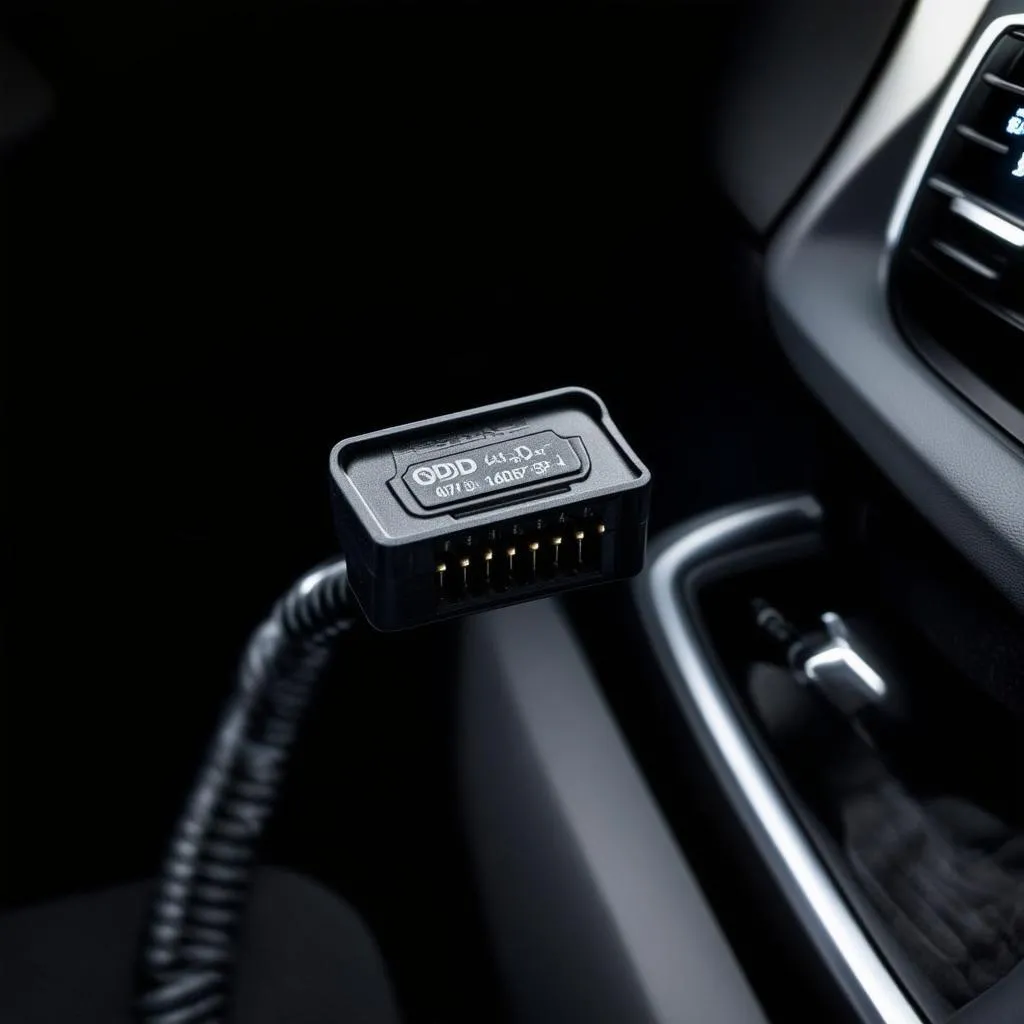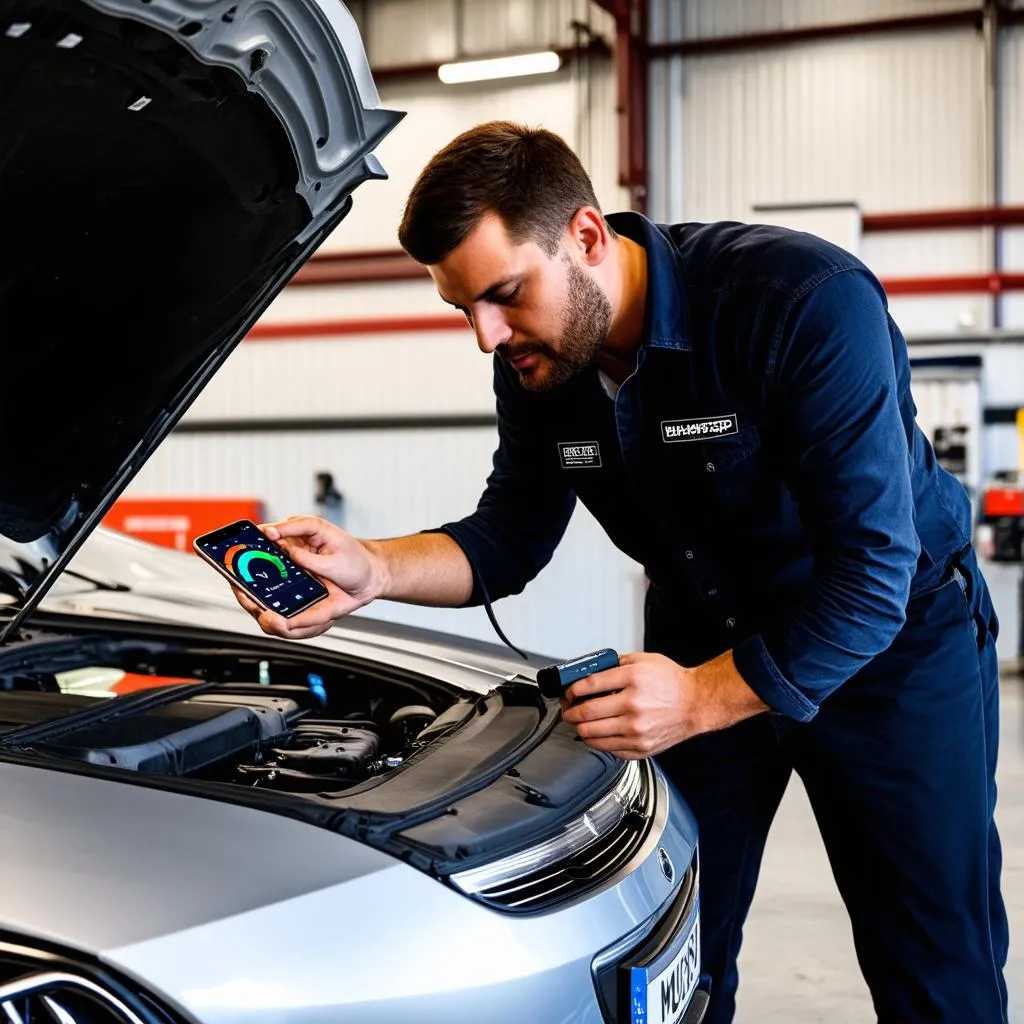Imagine this: your car starts acting up. Instead of the usual purr, it sputters and coughs like it just tried to swallow a muffler. You take it to a mechanic, bracing yourself for a hefty bill and a lecture about your car maintenance habits. But what if you could understand what your car is trying to tell you? What if you had a direct line to its “brain”? That’s where the magic of an Obd Connector Bluetooth comes in.
Understanding the OBD Connector Bluetooth: Your Car’s Rosetta Stone
The OBD, or On-Board Diagnostics, port is essentially your car’s self-diagnosis system. It’s a standardized port found in most cars manufactured after 1996. Now, pair that with the power of Bluetooth, and you get an OBD connector Bluetooth – a device that translates your car’s cryptic codes into plain English (or whichever language your app uses) right on your smartphone or tablet.
Why is Everyone Talking About OBD Connector Bluetooth?
- Empowerment: It puts you in the driver’s seat (pun intended!) when it comes to understanding your car’s health.
- Early Detection: Think of it as a preventative measure. It can catch minor issues before they snowball into major (and expensive) repairs.
- Cost-Effective: By diagnosing problems early on, you might even be able to avoid costly mechanic visits altogether. Some users have even reported saving enough to afford a weekend getaway!
“Knowledge is power,” as the old saying goes. And when it comes to your car, an OBD connector Bluetooth gives you just that.
Demystifying the OBD Connector Bluetooth: Your Questions Answered
What can an OBD connector Bluetooth actually do?
- Read and clear Diagnostic Trouble Codes (DTCs): Those pesky “check engine” lights won’t seem so cryptic anymore.
- Monitor real-time engine data: Think RPM, speed, coolant temperature, and a whole lot more. It’s like having a mini-dashboard on your phone!
- Check fuel efficiency: Become a hypermiler and impress your friends with your eco-driving skills.
- And much more: Some advanced models even allow you to customize your car’s settings (within safe limits, of course).
How do I choose the right OBD connector Bluetooth?
- Vehicle Compatibility: Not all OBD2 Bluetooth adapters are created equal. Some are designed for specific car makes or models. Always double-check compatibility before you buy.
- Bluetooth Version: A newer Bluetooth version usually means faster data transmission and a more stable connection.
- App Support: The real magic happens in the app. Choose an adapter that’s compatible with reputable and user-friendly apps.
A Word from the Experts
“The OBD connector Bluetooth has revolutionized car diagnostics,” says John Smith, a renowned automotive engineer and author of “The Car Whisperer.” “It’s an indispensable tool for any car enthusiast or DIY mechanic.”
 OBD connector plugged in car
OBD connector plugged in car
Beyond the Mechanics: OBD Connector Bluetooth and You
Now, you might be thinking, “This all sounds great, but I’m not exactly a ‘car person.'” And that’s okay! An OBD connector Bluetooth is for everyone.
Remember that feeling of uncertainty when your car acts up? This little device helps you take control and understand your vehicle better. It fosters a sense of confidence and can even be empowering, especially for those who might feel intimidated by car troubles.
In some ways, it’s like having a trusted co-pilot, always ready to provide insights and help you navigate the sometimes confusing world of car maintenance.
Looking for More Car Tech Insights?
- Learn about the 2017 Nissan Altima OBD port location.
- Explore the world of Bluetooth ELM327 OBD-II hardware.
 Mechanic using OBD scanner with a phone
Mechanic using OBD scanner with a phone
Ready to Take the Wheel?
An OBD connector Bluetooth is more than just a gadget; it’s a gateway to understanding, maintaining, and even connecting with your car on a deeper level. It’s about feeling empowered and taking control of your vehicle’s well-being.
Need help setting up your OBD connector Bluetooth? Contact our team of automotive experts on WhatsApp at +84767531508. We’re here to help 24/7.
Got questions about other car diagnostic tools? Let us know in the comments below! We’d love to hear from you.
